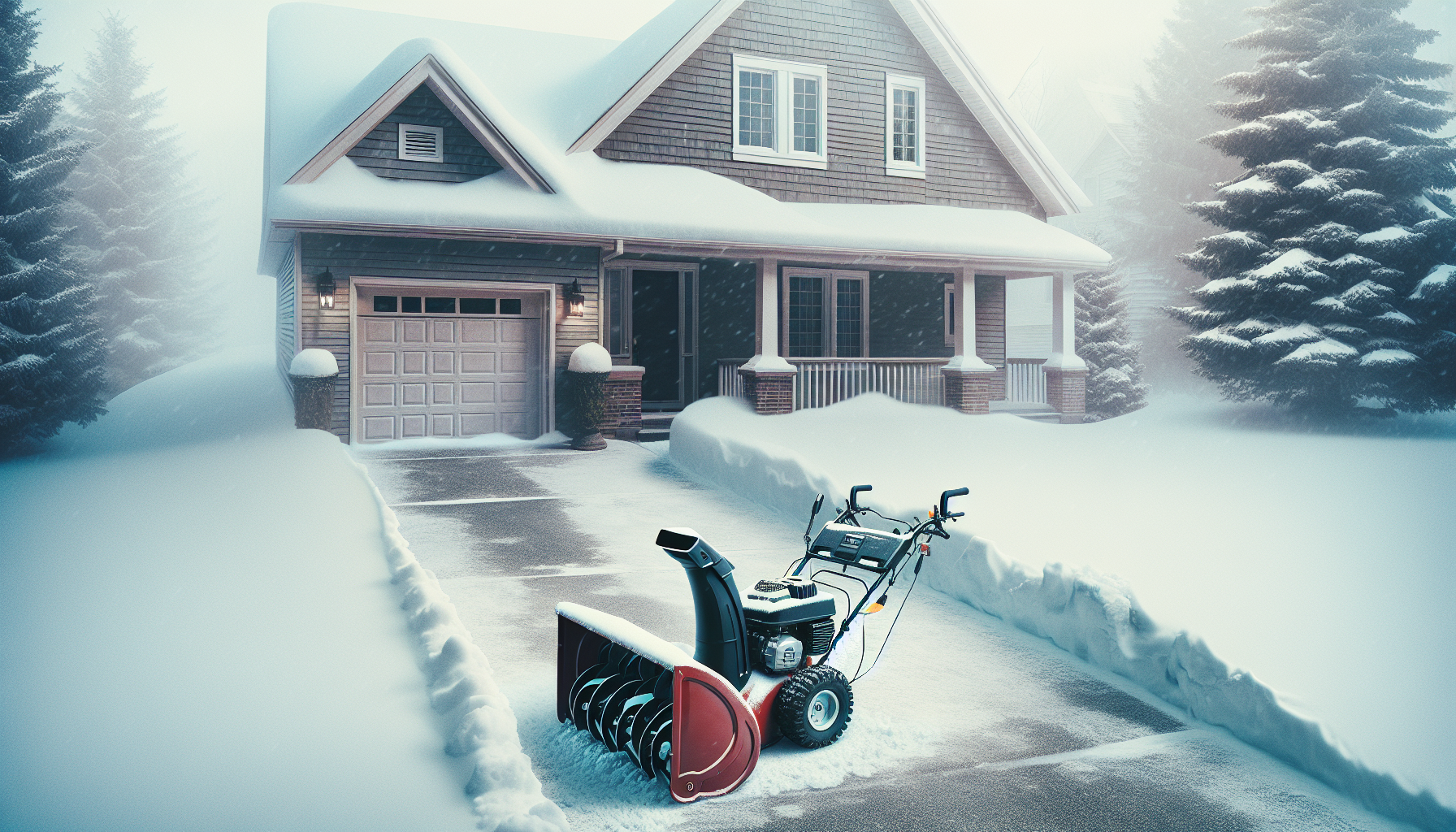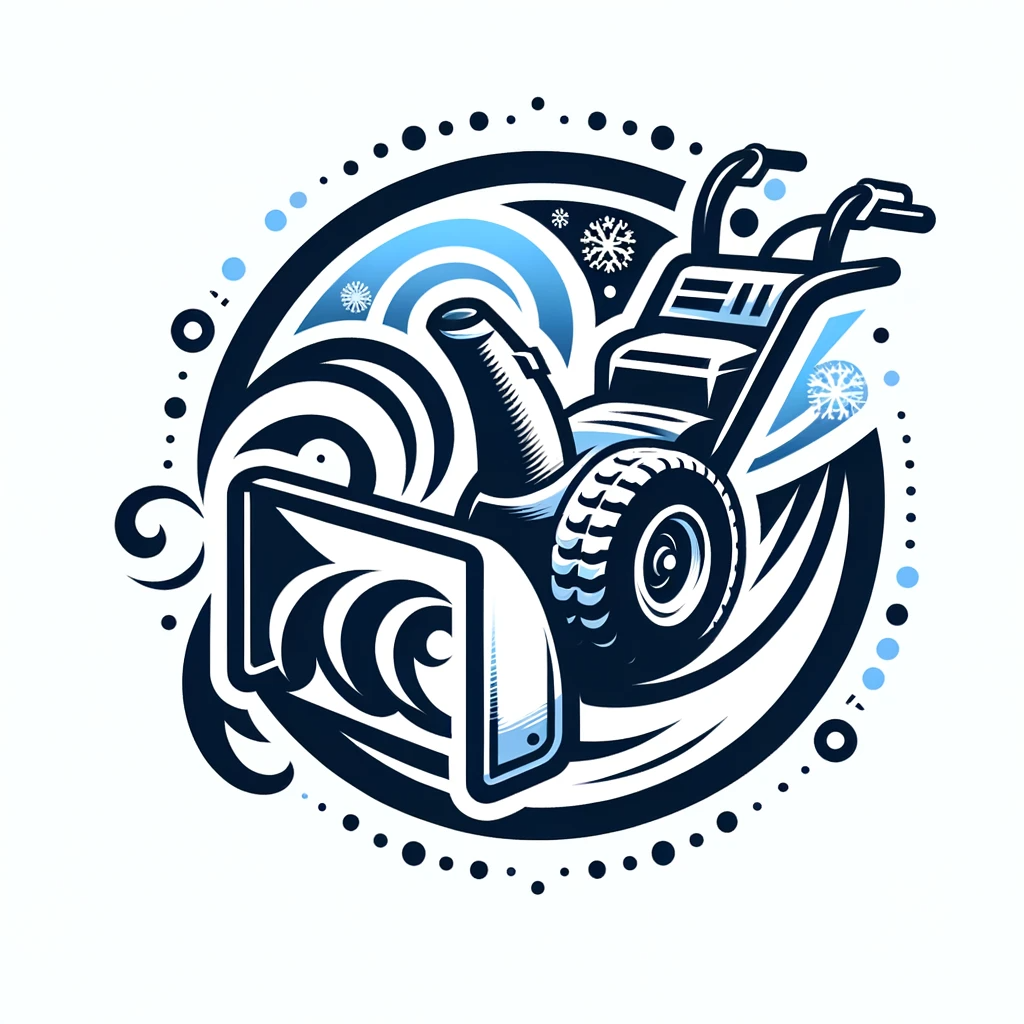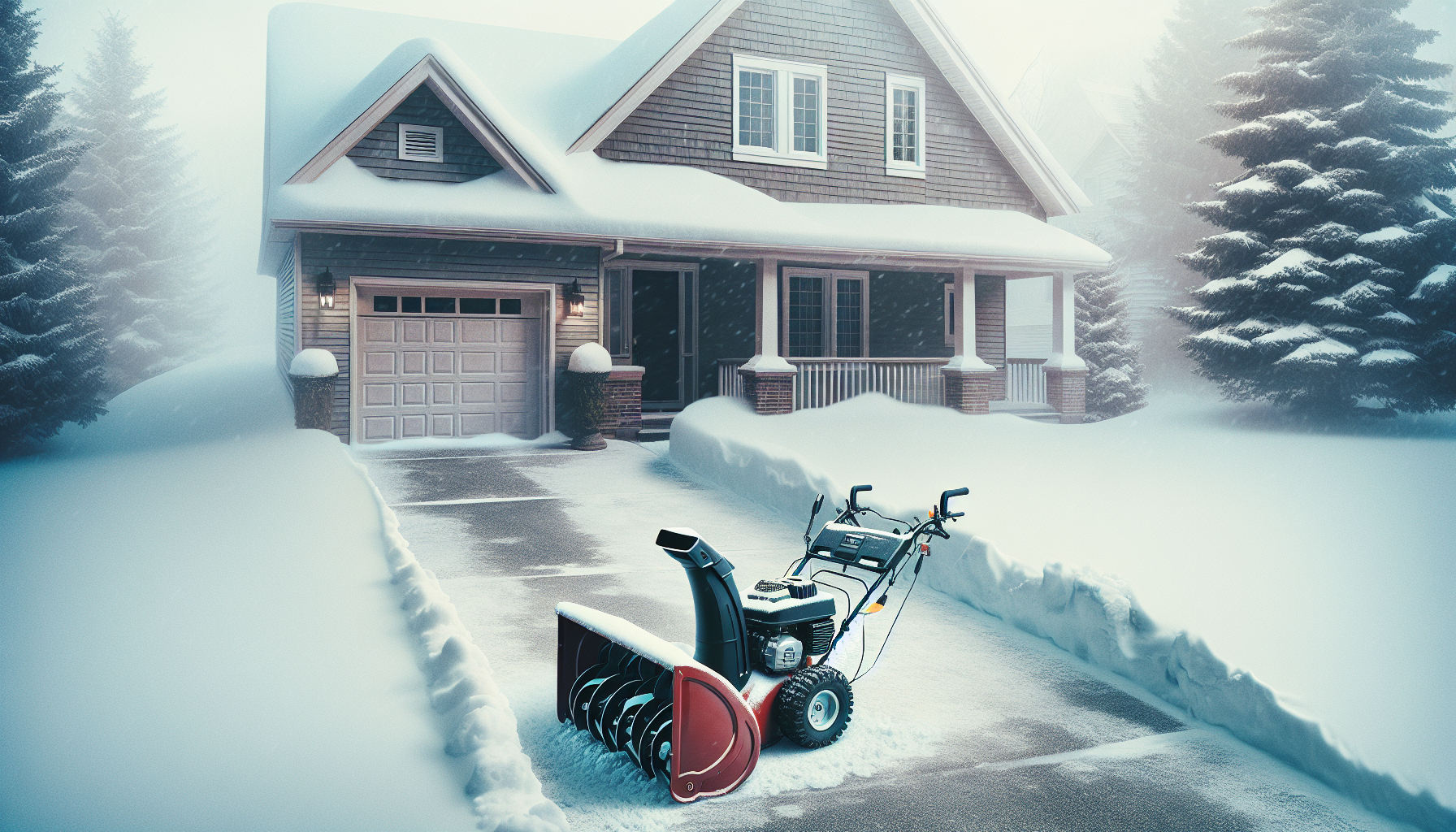You know the joy of waking up to a winter wonderland, but as you glance out your window at the freshly fallen snow, a question arises – do snow blowers damage driveways? It’s a concern many homeowners face when it comes time to clear their driveways of the white stuff. In this article, we’ll explore the potential impact that snow blowers can have on your driveway and provide you with some tips to protect it during the winter months. So, sit back, grab a warm drink, and let’s tackle this common winter dilemma together. Many people wonder if using a snow blower will damage their driveway. While it is true that some snow blowers can cause damage if not used properly, there are steps you can take to prevent this from happening. In this article, we will explore different types of snow blowers, factors that can influence driveway damage, the impact of snow blower usage on driveways, how to prevent driveway damage, choosing the right snow blower for your driveway, driveway maintenance tips, warranty and insurance considerations, alternatives to snow blowers, and common misconceptions. By the end of this article, you will have a better understanding of how to protect your driveway while effectively clearing snow.

Types of Snow Blowers
Single-stage snow blowers
Single-stage snow blowers are the most basic type of snow blower. They are lightweight and easy to maneuver, making them ideal for small driveways and light snow conditions. These snow blowers use an auger to scoop up the snow and then throw it out of the chute. While they are effective at clearing snow, they may not be suitable for heavy or wet snow.
Two-stage snow blowers
Two-stage snow blowers are more powerful than single-stage snow blowers and are suitable for larger driveways and heavier snow conditions. They have an auger that breaks up the snow and a separate impeller that throws it out of the chute. This two-stage process allows them to handle large amounts of snow and clear it quickly.
Three-stage snow blowers
Three-stage snow blowers are the most powerful and efficient type of snow blower. They have an additional accelerator that helps break up the snow before it enters the auger, making them even more effective at clearing heavy and wet snow. These snow blowers are best suited for large driveways or areas with frequent heavy snowfall.
Factors Influencing Driveway Damage
Type of driveway material
The type of material your driveway is made of can play a significant role in its susceptibility to damage from a snow blower. Concrete and asphalt driveways are generally more durable and can withstand the mechanical contact of a snow blower better than gravel driveways. However, it is essential to consider the age and condition of the driveway as well.
Age and condition of the driveway
An old or poorly maintained driveway is more likely to be damaged by a snow blower. Cracks, potholes, or weakened surfaces can lead to further damage when the snow blower passes over them. It is crucial to inspect your driveway regularly and make any necessary repairs before the winter season to minimize the risk of damage.
Frequency of snow blowing
The frequency at which you use your snow blower can also impact your driveway’s condition. Frequent use can cause more wear and tear on the surface, leading to potential damage. If possible, try to limit snow blowing to when it is necessary rather than using it for every small amount of snow.
Snow blower maintenance
Proper maintenance of your snow blower is essential to prevent damage to your driveway. Regularly inspect and clean the blades, auger, and chute to ensure they are in good working condition. Lubricate moving parts as instructed in the user manual and replace any worn or damaged parts promptly. Taking care of your snow blower will not only help prevent driveway damage but also ensure its longevity and effectiveness.
Impact of Snow Blower Usage on Driveways
Mechanical contact
One of the main concerns with snow blowers is the mechanical contact between the blades or auger and the driveway surface. This contact can cause scraping or scratching, especially if the blades are not set at the appropriate height. However, by following proper usage techniques and taking preventative measures, you can minimize the risk of damage from mechanical contact.
Scratching or scuffing
Improper use of a snow blower can lead to scratching or scuffing of your driveway surface. This can be caused by setting the blades too low or pushing the snow blower too aggressively. It is important to adjust the height of the blades according to your specific driveway material and conditions and to use controlled and deliberate movements while operating the snow blower.
Cracking and chipping
Although less common, snow blowers can potentially cause cracking or chipping of your driveway. This is more likely to occur if your driveway already has existing cracks or weakened areas. Be sure to inspect your driveway before using the snow blower and make any necessary repairs to minimize the risk of further damage.
Removing top layer
Over time, a snow blower can gradually remove the top layer of your driveway, especially if it is made of gravel or softer materials. This can result in a rougher surface and potentially expose the underlying layers. To prevent this, it is important to adjust the height of the blades properly and avoid aggressive usage.
Preventing Driveway Damage
Using skid shoes or skid plates
Most snow blowers come equipped with skid shoes or plates that elevate the blades slightly above the surface. These accessories help prevent the blades from coming into direct contact with the driveway, reducing the risk of damage. It is essential to ensure that the skid shoes or plates are adjusted to the appropriate height for your specific driveway material to maximize their effectiveness.
Adjusting the height
Properly adjusting the height of the blades on your snow blower is crucial to prevent driveway damage. Refer to the user manual or consult a professional if you are unsure about the correct settings for your specific driveway material. By setting the blades at the optimal height, you can effectively clear the snow without causing unnecessary damage.
Avoiding aggressive usage
Using your snow blower in a controlled and deliberate manner can significantly reduce the risk of driveway damage. Avoid pushing or forcing the snow blower through the snow, as this can lead to scratching or scraping. Instead, allow the machine to do the work and guide it gently along the driveway. This approach will not only protect your driveway but also improve the performance and longevity of your snow blower.
Clearing the driveway properly
To minimize the potential for damage, it is important to clear your driveway properly before using a snow blower. Remove any large debris, such as rocks or branches, that could get caught in the blades. Additionally, if there is a significant amount of snow, consider using a shovel or snowplow attachment to clear a path before using the snow blower. This will make the snow blowing process easier and protect your driveway from unnecessary strain.
Choosing the Right Snow Blower for Your Driveway
Consider the size of your driveway
The size of your driveway will determine the type and power of snow blower that is suitable for your needs. Smaller driveways can often be effectively cleared with a single-stage or smaller two-stage snow blower, while larger driveways may require a more powerful three-stage snow blower. Consider the width and length of your driveway to ensure you choose a snow blower that can handle the workload.
Paying attention to power and features
When selecting a snow blower, it is essential to consider the power and features it offers. More powerful snow blowers are generally better equipped to handle heavy or wet snow and can clear larger areas more efficiently. Look for features such as adjustable blades, multiple speeds, and chute controls, as these can greatly enhance the snow blowing experience and minimize the risk of driveway damage.
Matching the snow blower to your driveway surface
Different types of driveway surfaces may require different snow blowers or adjustments to prevent damage. For example, if you have a gravel driveway, you may need to adjust the blades higher to avoid scraping the surface. Consider the specific requirements of your driveway material and consult with a professional if you are unsure about which snow blower is best suited for your needs.
Driveway Maintenance Tips
Repairing cracks and potholes
Regular maintenance of your driveway is essential to prevent further damage from snow blowers or other factors. Inspect your driveway for any cracks, potholes, or other surface imperfections before the winter season. Fill and repair these areas promptly using appropriate materials to ensure a smooth and durable surface.
Sealing the driveway
Sealing your driveway can help protect it from damage caused by freezing and thawing cycles. Applying a sealant every few years can help prevent cracks and extend the lifespan of your driveway. Consult with a professional or follow the instructions on the sealant product to ensure proper application.
Proper shoveling techniques
While snow blowers are a convenient tool for clearing snow, it is still important to know proper shoveling techniques. Before using a snow blower, remove any large or heavy snow piles with a shovel, making the snow blowing process easier and reducing the strain on your snow blower. Use a sturdy shovel with an ergonomic handle and lift with your knees to avoid unnecessary stress on your body.
Warranty and Insurance Considerations
Reviewing the snow blower warranty
Before purchasing a snow blower, it is important to review the warranty provided by the manufacturer. Check if it covers any potential damage to your driveway caused by the snow blower. Understanding the terms and conditions of the warranty will help you make an informed decision and provide peace of mind.
Checking homeowners insurance coverage
In addition to reviewing the snow blower warranty, it is also advisable to check your homeowners insurance policy for coverage related to driveway damage. Some policies may include coverage for unintentional damage caused by snow blowers or other equipment. Contact your insurance provider to inquire about your coverage options and ensure you have adequate protection.
Alternatives to Snow Blowers
Using a snow shovel
If you are concerned about potential driveway damage from a snow blower, using a snow shovel may be a suitable alternative. While shoveling requires physical effort and can be time-consuming, it allows for more control over the snow removal process. Use proper shoveling techniques to minimize strain on your body and ensure effective snow removal.
Hiring professional snow removal services
For those who prefer to leave snow removal to the experts, hiring professional snow removal services is a viable option. These services have the equipment and expertise to clear your driveway efficiently while minimizing the risk of damage. While it may be an added expense, outsourcing snow removal can save you time and provide peace of mind.
Common Misconceptions
All snow blowers cause driveway damage
One common misconception is that all snow blowers cause driveway damage. While it is true that improper use or a lack of maintenance can result in damage, many snow blowers are designed to minimize the risk of driveway damage. By following proper usage techniques and taking preventative measures, you can effectively clear snow without causing harm to your driveway.
Driveway damage is inevitable with snow blowers
Another misconception is that driveway damage is inevitable when using a snow blower. While some wear and tear may occur over time, proper usage, maintenance, and preventative measures can significantly reduce the risk of damage. By choosing the right snow blower, adjusting the blades properly, and handling the machine with care, you can maintain a clean and undamaged driveway.
Conclusion
Snow blowers can be a valuable tool for clearing snow from your driveway, but they require proper usage and maintenance to prevent driveway damage. By considering factors such as the type of driveway material, frequency of snow blowing, and snow blower maintenance, you can minimize the risk of driveway damage. Additionally, taking preventative measures like using skid shoes, adjusting the height, avoiding aggressive usage, and clearing the driveway properly can further protect your driveway. It is also important to choose the right snow blower for your specific driveway, paying attention to its size, power, and features. By following these guidelines and considering alternatives like using a snow shovel or hiring professional snow removal services, you can effectively clear snow while maintaining a safe and undamaged driveway. Remember, driveway damage is not inevitable, and with the right knowledge and precautions, you can enjoy a snow-blown driveway without any adverse effects.


